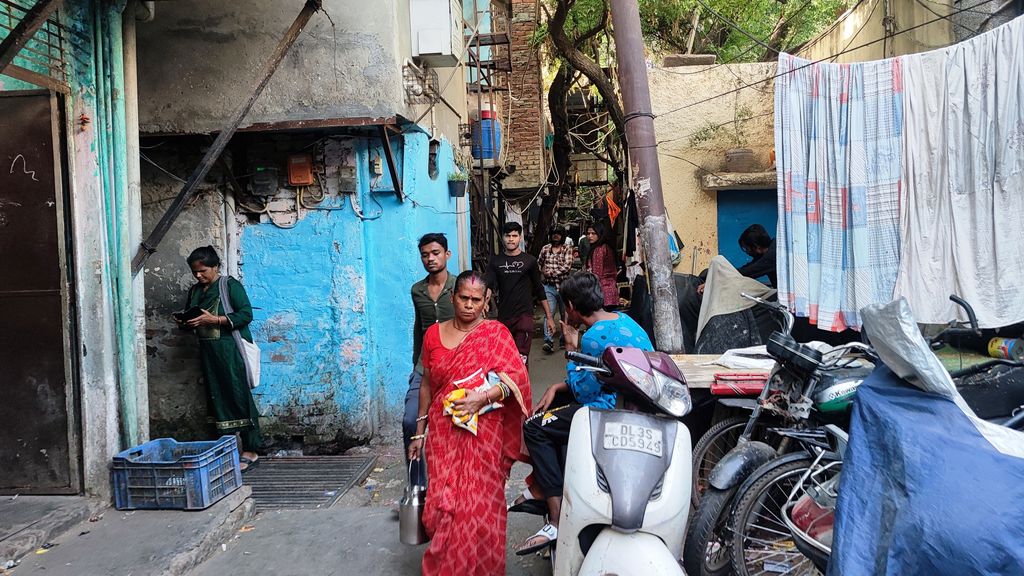Noos News•
In India (1.4 billion people), voters can still cast their ballots until June 1 in the parliamentary elections that began on April 19. Prime Minister Modi is aiming for a third term in office. Under his leadership, the country grew to become the fifth largest economy in the world. India is expected to reach the top three in the coming years, Modi and other members of the ruling Bharatiya Janata Party have stressed on the campaign trail.
But the rate of economic growth is controversial. Critics also say that basic numbers about the Indian economy are missing, leaving tens of millions of people without social benefits – with all the consequences.
The latter can be clearly seen in the Lal Gumbad Basti slum, south of the capital, New Delhi. People there say they need food aid. To qualify, they need a food card, but they don’t get one. “India is moving forward, but only for the rich,” says a Kaushaliya resident. “There is no progress for the poor.”
Kaushalya barely earns 50 euros a month as a cleaner, and her husband’s income is irregular. Her in-laws have a food card, but only for themselves. The fact that the family has now expanded with a daughter-in-law and two children makes it difficult. That’s why she applied for her own card three years ago, to no avail. “I was sent from pillar to post.”
Under India’s National Food Security Act, people with a special ration card get 5 kg of free grains such as rice and wheat flour every month. Currently this is 800 million people. But this number was determined based on the 2011 census.
The problem is that there are no reliable current figures on the size of the population and their finances, says activist Anjali Bharadwaj of the Right to Food Campaign.
Old data, new data missing
In 2021, the decennial census was postponed. This was due to the Corona pandemic, but the new census was postponed indefinitely. Based on estimates, India’s population has grown so much that, according to Bharadwaj, at least 900 million people are eligible for food distribution. Since each state is allowed to issue a maximum number of cards, people like Kaushalya are scrambling.
Bharadwaj’s research shows that 300,000 people in Delhi alone are waiting for a ration card. “In many other states there is not even the option to apply for one because the quota has been reached.”
So the government assumes that no new poor have been added since 2011. “In the Supreme Court, the government argued that per capita income had risen to the point that the number of people who needed To a ration card, it was logically reduced,” referring to a case dating back to November 2022. A nonsense argument. “The same judge also said that average income says nothing about inequality or the number of poor people,” he added.
The rate of economic growth is also subject to severe criticism. In April, a difference of opinion arose between the International Monetary Fund and India’s delegate to the IMF, Krishnamurthy Subramanian. It expected growth of 8 percent for India. The International Monetary Fund has publicly opposed it and stuck to the expected growth of 6.5%. A former adviser to the Modi government had earlier described the growth figure of more than 8 percent as “baffling”. He also said that the number of foreign investments in India has reached an all-time low.
In the 2019 elections, the growth figures presented by the Modi government were severely criticized.
“Lack of political will”
Bharadwaj refers to international reports such as the Oxfam report on inequality and the Global Hunger Index to show how huge the inequality between the rich and the poor is. “It is true that we have more and more billionaires in the list of the top 100 billionaires in the world. But at the same time there are unprecedented levels of unemployment since the Corona pandemic and high inflation.” The fact that the government, however, does not want to increase the number of people entitled to food distribution is due to a lack of political will.
The results of the parliamentary elections are expected to appear on June 4, three days after the polls close.
Interviews and photos by Raghavendra Verma.









